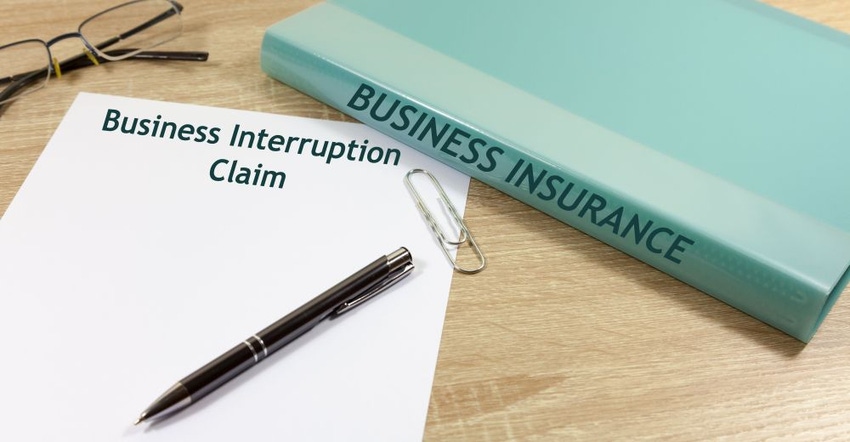Millions of businesses have been disrupted due to the coronavirus. Find out whether business-interruption insurance can help your self-storage operation mitigate loss during the crisis.

All businesses are suffering some loss of revenue during the coronavirus pandemic. The current government mandates can impact a company in so many ways, from limiting growth opportunities to creating the need for employee layoffs. In self-storage, we’re also seeing increased tenant delinquencies. As a facility owner or operator, you may be wondering which (if any) of your business insurance coverages might mitigate potential loss. Let’s take a look.
Business-Interruption Coverage
An obvious question you may have is whether coronavirus-related losses would be covered under your business-interruption policy, if you have one. After all, this is an “interruption” for which the business isn’t responsible. Though it would seem logical that this unanticipated pandemic would trigger the right to make a claim against this coverage, your insurance provider likely has a different opinion on the matter.
Most general-liability insurance policies, even those with business-interruption coverage, have a long list of exclusions. Keep in mind that nowhere in your policy will you likely see a specific reference to an exclusion for a virus or pandemic that forces business closure (though you’ll likely see this in the future). Instead, any discussion of coverage will rely on multiple sections of your policy and how they interact under the facts of your particular claim. Here are a couple of things your insurance company might reference:
Pollution exclusion: The definition of “pollution” can be very general, but it would likely include “gaseous contaminants or irritants.” It could be argued that a virus “in the air” is the same as a gas leak, smoke, fumes, chemicals, etc., and would therefore be excluded from coverage.
Physical loss or damage: Your policy might require that there be direct physical loss or damage to your property that causes the business closure, and that the loss or damage resulted from a covered cause of loss.
What about contingent business-interruption coverage? Instead of arguing that your property was damaged, you might claim your operation has suffered due to damage to a third party involved in your business (i.e., your tenants). Typically, however, the type of damage covered under this policy would have to be similarly covered within the insured’s policy, and similar exclusions to those referenced above may apply. Also, the claim would have to arise from your loss of business income directly due to the loss or damage of direct suppliers to your business or direct receivers of your business (arguably your customers).
Civil or Military Authority Coverage
Check to see if you’re covered for business-interruption losses caused by “civil or military authority,” which is coverage for actual losses sustained when access to a business is prohibited by an order of civil authority. Due to state and local shelter-in-place orders, an argument could be made that your business operation was stopped by government-issued mandates.
However, for the coverage to be triggered, the policy and insurer might require that there must be physical damage to the business. Another issue to be considered is whether direct access to the property was imposed (some self-storage facilities have been listed as essential businesses). If your insurance company agrees you’re covered for these interruptions, the coverage would typically include payment for the actual loss sustained, including necessary repairs and loss of income (net profit or loss before taxes) during the period the business is shut down and, if included, coverage for the period of restoration or time required to rebuild the property for operation.
Unusual Circumstances
This is an unfamiliar time, and business losses will cut deep. Based on the rareness of this crisis, the emergency orders in place, the insurance policy you have and the riders you’ve paid for, you may have coverage to help you recover from losses; but every policy is different, and the facts surrounding each claim will be unique.
Don’t assume you do or don’t have coverage; ask your insurance provider. There’s no prohibition to making a claim as long as you’ve made in good faith. Due to the circumstances of this pandemic and what businesses are likely to face moving forward, lawsuits will certainly clarify the rights of self-storage operators seeking a remedy under coverage provisions for losses suffered during this crisis.
Scott I. Zucker is a founding partner in the Atlanta law firm of Weissmann Zucker Euster Morochnik & Garber P.C. and has been practicing law since 1987. He represents self-storage owners and managers throughout the country on legal matters including property development, facility construction, lease preparation, employment policies and tenant-claims defense. He also provides, on a consulting basis, advice to self-storage companies in the areas of foreclosure and lien sales, premises liability, and loss-control safeguards. To reach him, call 404.364.4626; e-mail [email protected].
About the Author(s)
You May Also Like





